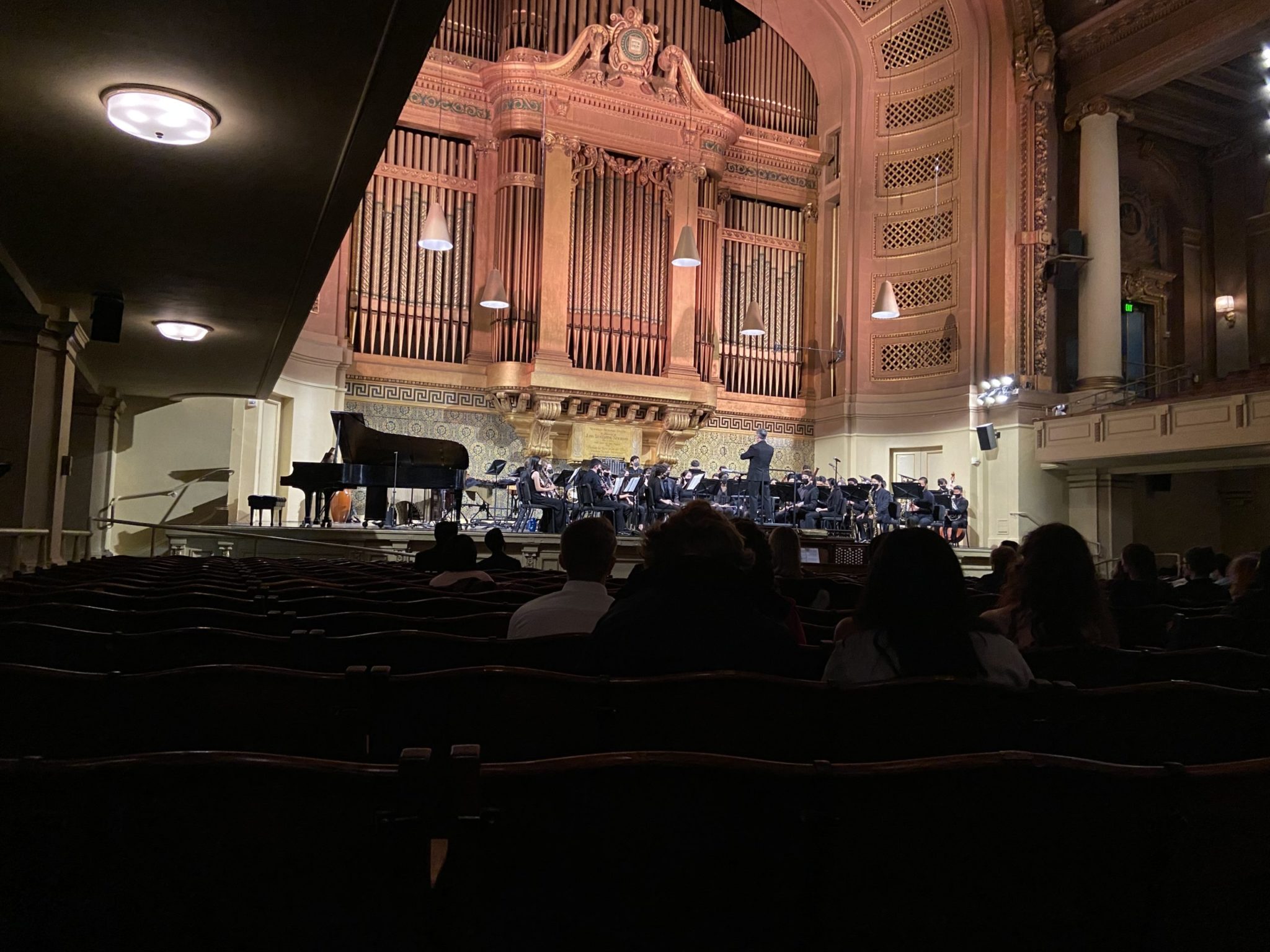Jazz Rocking: The Yale Undergraduate Jazz Collective’s “Night in Jazz-Rock Fusion” moves and grooves
As the Yale Undergraduate Jazz Collective’s Dec. 3 concert ended on the reverberating last note of Chick Corea’s iconic jazz-rock fusion song “Spain,” a thunderous applause ripped through the Jonathan Edwards college theater.

Zoe Berg, Photo Editor
As the Yale Undergraduate Jazz Collective’s Dec. 3 concert ended on the reverberating last note of Chick Corea’s iconic jazz-rock fusion song “Spain,” a thunderous applause ripped through the Jonathan Edwards college theater. This, however, is only how the concert finished. How it started is much more interesting.
In his opening remarks for the show, Michael Veal, professor of ethnomusicology and a mentor for the YUJC, called attention to the topical importance of the jazz-rock fusion genre.
“1969 was a tumultuous year in the history of the United States,” Veal said. “Humans walking on the moon, a war raging on in South Asia … gender equality, sexual equality, the environment, civil rights, Black Power, second wave feminism … Sound familiar?”
This set the scene for the YUJC’s time-bending, genre-warping performance. In a rendition of Herbie Hancock’s “Watermelon Man,” Kevin Chan ’24 played a lone, fleeting flute melody, and was then joined by the steadfast drums and bass, which fell into the full force of a funky, groove-inducing A-section. “Birdland” by Weather Report gave, at first, a repetitive and spirited melody line, but then lulled between the main chorus and impressive solos. The interesting line-up of jazz fusion moved more than just the audience’s hearts — hips seemed to be moving in tandem.
Ethan Dodd ‘22, who played the tenor saxophone at the performance, described jazz-rock fusion as “not your typical swing that you hear in a bebop or post-bop group, which would be like a ‘spang-spang-a-lang-spang-a-lang’ type of feel.”
Spanging and langing might be hard to envision, but hearing YUJC’s performance made clear the difference between fusion and “pure” jazz. While hearing the word “jazz” might conjure up visions of a smoky Harlem bar and YouTube videos of “Café Jazz Beats to Study To,” jazz-rock fusion appeals to the more modern pop music trends of recent generations.
“People really vibe with jazz rock fusion because it’s closer to the music that they listen to,” Dodd remarked. “It’s easier for people who listen to The Strokes or Arctic Monkeys to relate to this kind of jazz.”
Chan also noted that there is a difference in instrumentation in jazz-rock.
“We had an electric bass and an electric guitar this time,” he said. “In previous performances we’ve only had a stand up bass.”
“A lot of bassists also weren’t used to electric basses at this period,” Dodd said. “They were still trying to do the older jazz thing of blocking or playing a lot of notes. It’s more about keeping a funk groove going.”
Dodd added that jazz fusion has more of a distorted and “electric” sound.”
For Akeel Vitarana ‘24, an alto saxophone player in the YUJC who is also a data desk staffer for the News, this concert was particularly special.
“This has been my first in person, rehearsed concert at Yale,” Vitarana said. “It’s nice to see live music return to Yale. Something that Yale is known for, obviously, is its live music scene, and so many people here just want to play live music.”
Vitarana also noted that the return to campus has been important to the YUJC for more than just live music. He noted that the organization has traditionally focused on bringing professional musicians onto campus and “less on putting on student shows,” and is excited at the prospect of bringing performers to campus once again.
At the concert, musicians head-bopped, foot-tapped and full-body-grooved with every beat.
To end as the concert began, with words from professor Veal:
“[Jazz music] speaks to us today in 2021 just as powerfully as it did in 1969,” Veal said in his opening remarks. “We’re still fighting the same battles.”
Information about future performances can be found on the YUJC website. YUJC “Jam sessions” take place every other Sunday.







